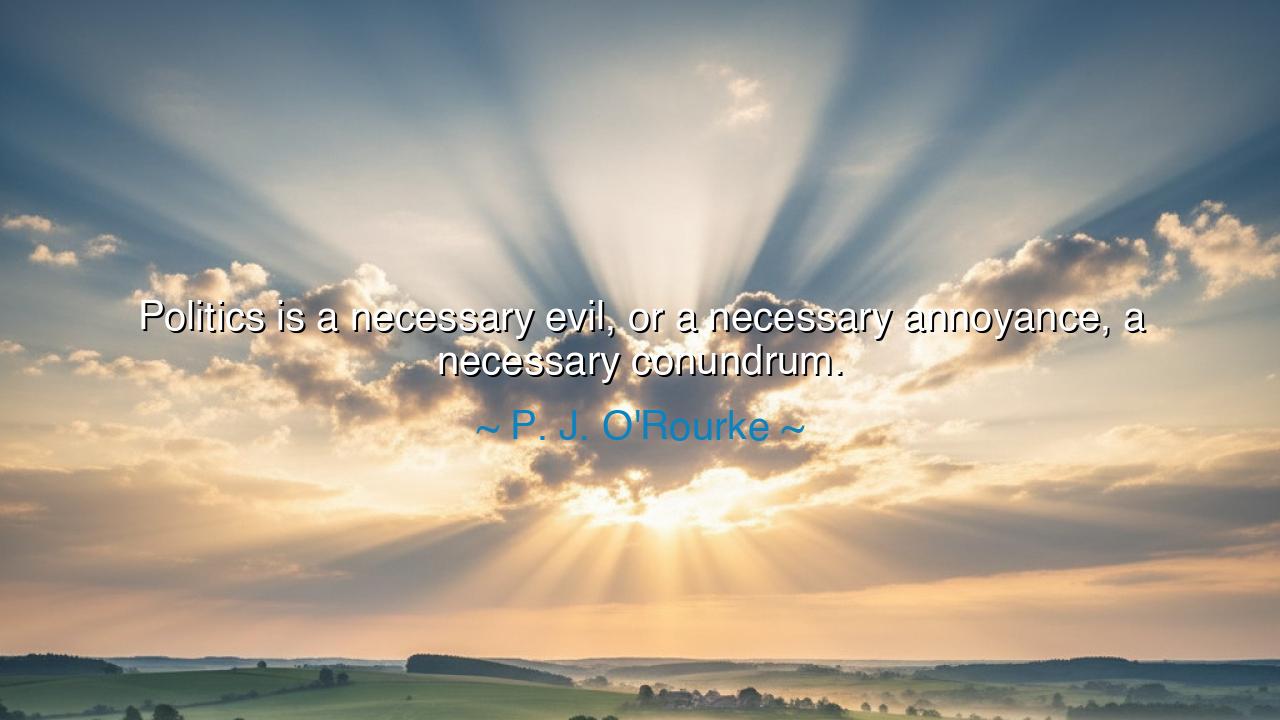
Politics is a necessary evil, or a necessary annoyance, a






O children of the future, hear the words of P. J. O'Rourke, who speaks of politics as a force that cannot be ignored, yet often feels like a necessary evil: "Politics is a necessary evil, or a necessary annoyance, a necessary conundrum." In these words, he acknowledges the paradox of politics—that though it is essential for the structure and function of society, it often brings with it frustration, confusion, and moral compromises. O'Rourke invites us to see politics not as a pure force of good, but as a tool that, when wielded by the human hand, is burdened with complexities, contradictions, and struggles.
In the ancient world, the Greek philosophers often wrestled with the question of political power. Socrates, though a lover of wisdom, was deeply skeptical of politics. He believed that those who sought power were often driven by ambition, ego, and desire for control, rather than by a desire to serve the greater good. Plato, in his works, explored the idea of the philosopher-king, someone who would rule with the wisdom of the gods, yet even he knew that the path to such a leader would be fraught with challenges and contradictions. The political realm, then, was always a necessary evil—one that could either lead to great good or terrible harm, depending on the hands that held it.
Consider the tale of Caesar Augustus, the first Roman Emperor, whose reign brought peace and prosperity to the empire after years of civil war. Yet, his political ascent was marked by manipulation, betrayal, and the consolidation of power in his own hands. While his leadership led to the Pax Romana, the long-lasting peace, it was also the birth of a dictatorship that undermined the Republic. Augustus, like many rulers before and after him, understood that politics was a necessary conundrum, requiring both wisdom and cunning, and often forcing one to walk a fine line between justice and compromise.
In more modern history, the example of Winston Churchill during World War II embodies this idea of politics as both a necessary evil and a conundrum. Churchill, though a fierce leader, was often faced with the frustrations and contradictions of political life—balancing the demands of the war, the needs of his countrymen, and the ever-shifting alliances on the world stage. His leadership was necessary to defeat the forces of Nazi tyranny, yet his path was not free from compromise, criticism, and moral dilemmas. He, like O'Rourke, understood that while politics is an essential force in shaping the future, it often feels like a heavy burden that one must bear for the greater good.
O children, let us learn from O'Rourke and the great figures of the past who have navigated the necessary evil of politics. It is a force that shapes the destiny of nations, yet it is fraught with contradictions, struggles, and moral questions. Just as Socrates questioned the nature of power, and Churchill navigated the delicate balance of war and diplomacy, we must understand that politics is both a gift and a curse. It is not a path of purity, but one of complexity—one that requires wisdom, humility, and courage. May we tread carefully as we embrace its weight, knowing that while it is a necessary force, it is never without its challenges.






TANguyen Tuan Anh
By calling politics a ‘necessary evil,’ O'Rourke acknowledges that the system often frustrates, yet it remains essential. Does this viewpoint create apathy toward political engagement? Or is it a pragmatic recognition that even though the system is flawed, it still holds the power to drive change? How can we work toward a more effective and less annoying political system while accepting that some level of frustration is inevitable?
TAquan tuan anh
O'Rourke’s perspective on politics being a necessary annoyance brings up an interesting point about public disengagement. Many people feel disconnected or cynical about the political process. But if we accept it as a ‘necessary evil,’ does that mean we’re resigning ourselves to dissatisfaction? Could focusing on positive change rather than on the flaws of the system help improve overall political participation?
AKanh kim
The term ‘necessary conundrum’ in O'Rourke’s quote really resonates. Politics often feels like an endless puzzle with no perfect solution. It makes me wonder—if politics is inherently flawed, can we ever truly reform the system, or are we stuck managing a ‘conundrum’ for the foreseeable future? How do we reconcile the need for a functional political system with the frustration it often causes?
TVThanh Vi
O'Rourke’s quote suggests that while politics may feel burdensome or annoying, it is still essential for governing and maintaining order. It raises the question: Is the political process inherently flawed, or is it just the way people interact with it that causes frustration? What would it take for people to engage with politics more constructively, rather than just viewing it as a necessary evil?
BNNguyen Bao Ngoc
P.J. O'Rourke’s take on politics as a ‘necessary evil’ is both cynical and realistic. Politics often feels like a frustrating yet unavoidable part of society. But does seeing politics this way hinder meaningful engagement? Should we strive for a more positive outlook on politics, or is it simply a necessary burden we must accept to maintain order and structure in society?